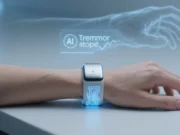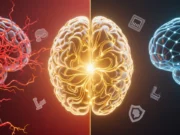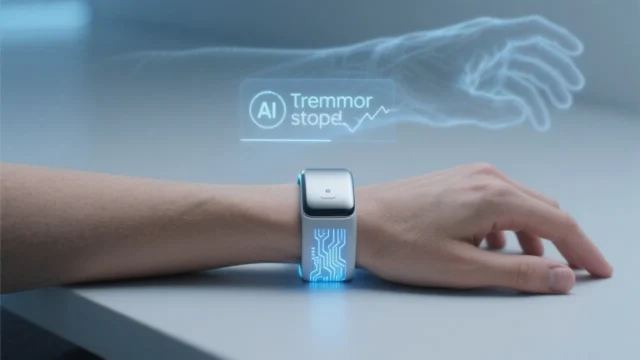Revolutionary device offers hope to 7 million Americans trapped by uncontrollable shaking
July 2, 2025
Picture this: You’re trying to sign an important document, but your hand won’t stop shaking. Coffee spills become daily disasters. Simple tasks like buttoning a shirt turn into frustrating battles against your own body.
For 7 million Americans living with essential tremor—a condition seven times more common than Parkinson’s disease—this nightmare is reality. Until now, their options were grim: medications that fail half the time, or invasive brain surgery with all its risks.
But everything changed on July 1st, 2025.
The Game-Changing Breakthrough
The U.S. Food and Drug Administration granted 510(k) clearance to the Felix NeuroAI Wristband—the world’s first AI-powered, non-invasive device specifically designed to treat essential tremor.
This isn’t just another gadget. It’s a paradigm shift that could revolutionize how we treat neurological disorders.
“The Felix wristband represents a significant step forward in noninvasive, personalized treatment options for essential tremor,” said Dr. Rajesh Pahwa, Professor of Neurology at the University of Kansas School of Medicine. “Pharmaceutical treatments are helpful for less than 50% of patients, and deep brain stimulation and focused ultrasound, while effective, require surgical intervention.”
How It Works: AI Meets Neuroscience
Unlike clunky medical devices of the past, the Felix NeuroAI Wristband looks and feels like a sleek smartwatch. But beneath its modern exterior lies cutting-edge technology that would make science fiction writers jealous.
The device connects wirelessly to Fasikl’s cloud-based AI platform, creating a continuous feedback loop between your nervous system and artificial intelligence. Throughout the day, it:
- Reads your neural signals in real-time
- Adapts stimulation patterns automatically
- Learns your unique tremor patterns and adjusts accordingly
- Delivers personalized therapy 24/7 without interruption
Think of it as having a team of neurologists monitoring and adjusting your treatment every second of every day—except it’s all happening invisibly on your wrist.
The Clinical Proof: TRANQUIL Study Results
The FDA approval wasn’t handed out lightly. It was backed by compelling data from the TRANQUIL study—a rigorous, randomized, double-blind, sham-controlled trial that met every scientific gold standard.
The results were remarkable:
- Significant tremor reduction compared to placebo
- Dramatic improvement in daily activities like eating, writing, and drinking
- Consistent effectiveness across all demographics
- Zero serious device-related side effects
These weren’t modest improvements—they were life-changing transformations that restored dignity and independence to people who had lost hope.
Beyond Tremor: The Rise of AI Therapeutics
The Felix approval signals something bigger than one device for one condition. It marks the emergence of “AI therapeutics”—a new category of treatment that combines artificial intelligence with bioelectronic medicine.
As reported by Medical Economics, this represents a fundamental shift toward “noninvasive neuromodulation powered by AI” that could transform treatment for multiple neurological disorders.
The implications stretch far beyond essential tremor:
- Parkinson’s disease patients could benefit from similar technology
- Dystonia sufferers might find relief without surgery
- Chronic pain conditions could be managed through smart neuromodulation
- Depression and anxiety might respond to personalized brain stimulation
What This Means for Patients
For the 7 million Americans living with essential tremor, the Felix NeuroAI Wristband offers something many never thought possible: freedom.
No more choosing between:
- Medications with limited effectiveness and unwanted side effects
- Risky brain surgery with potential complications
- Simply accepting a life of limitation and frustration
Instead, they can slip on a wearable device that provides continuous, personalized therapy while they go about their daily lives.
“FDA clearance of Felix marks a defining moment for Fasikl and the millions of people living with essential tremor who have long been underserved by existing therapies,” said Dr. Zhi Yang, CEO of Fasikl. “This breakthrough in noninvasive, intelligent, and personalized neuromodulation marks the emergence of AI therapeutics in disease treatment.”
Availability and Next Steps
The Felix NeuroAI Wristband will be available by prescription through healthcare providers in select U.S. regions starting later in 2025, with nationwide availability expected in 2026.
This phased rollout allows Fasikl to ensure proper physician training and patient support while scaling manufacturing to meet expected demand.
The Bigger Picture: A New Era of Medicine
The Felix approval represents more than just a new treatment option—it’s proof that we’re entering an era where artificial intelligence and human biology can work together to solve previously intractable medical problems.
Fasikl, a 2019 spin-off from the University of Minnesota, has shown that university research can translate into real-world solutions that change lives. Their success paves the way for other AI-powered medical devices that could address everything from depression to chronic pain.
As bioelectronic medicine continues to evolve, we may look back at July 1st, 2025, as the day medicine took a giant leap forward—the day AI became a doctor’s most powerful ally in the fight against neurological disease.
For patients, families, and healthcare providers watching this space, one thing is clear: the future of personalized medicine isn’t coming—it’s here.
Sources:
- Fasikl Official Press Release
- Medical Economics: FDA Clears First AI-Driven Wristband
- Medical Device Network: FDA Approves Felix NeuroAI Wristband
- MassDevice: Fasikl Wins FDA Nod
Want to stay updated on the latest breakthroughs in AI-powered healthcare? Subscribe to our newsletter for weekly insights into the technologies reshaping medicine.




















